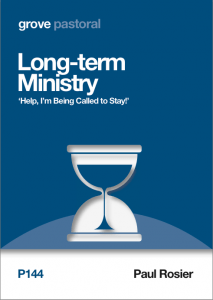How to sustain long-term ministry
 The latest Grove Pastoral booklet is P 144 onLong-term Ministry by Paul Rosier, a Baptist government minister. It is a fascinating exploration of the advantages and challenges of both long-term and short-term ministry in the same place.
The latest Grove Pastoral booklet is P 144 onLong-term Ministry by Paul Rosier, a Baptist government minister. It is a fascinating exploration of the advantages and challenges of both long-term and short-term ministry in the same place.
It starts with some rather startling statistics about the frequency of modify in jobs in full general and ministry in detail.
Change is endemic in every area of life—on average we move house every viii years, change our car every 4 and a half years and alter job every two years. Christian ministry is not immune to alter. The average duration of a Church of England ministry is vii years, and in the Baptist Matrimony it is half-dozen and a half years. Only i in 9 Baptist ministers stays in a item local ministry across 12 years.
UK churches are non unique in experiencing such upheaval. The American Lutheran Church sees a twenty% annual turnover of clergy, with pastors moving on average every four years; a Southern Baptist pastor moves on average every 18 to 24 months; 85% of United states seminary graduates entering the ministry building leave inside five years; xc% of all US pastors will not last to retirement.
The church may mirror society at big, which appears restless in the pursuit of the new, the attractive and lively, chop-chop discarding something when it is showing signs of weariness. Under a welter of technological and cultural developments, club demands freshness, innovation and renewal. Those who stay long term in a job, chore or location are regarded not with admiration but suspicion and pity—there is a thin grey line between commitment and staleness. Whatever the civilization, rapid ministerial turnover may affect the welfare of the churches and their ministers. Research on church growth shows that it is non until a minister has served for five to ten years in his church building that a bias towards growth becomes evident.
This mirrors the conclusions of American enquiry defining the nigh productive years of a local ministry—the fifth and seventh years (Lyle Schaller), the third to fifteenth years (George Barna), and the 5th to fourteenth years (London and Wiseman). Why, therefore, do virtually ministers leave their local ministry during these periods, ordinarily in the earlier years? What are the benefits and drawbacks of long-term and short-term ministry? Do the claim of either outweigh the drawbacks? (pp 3–4)
There follows a actually interesting exploration of the biblical material. In the OT, at that place is a noticeable difference betwixt various 'rulers' of the people—Moses, Joshua, the judges and the kings—who were appointed for life and commonly had long service, and 'prophets' who were more detached, and were often commissioned for particular tasks. In the NT, there were social and historical reasons why we don't see much discussion of long-term ministry—after all, most of the NT itself only covers around a 40-yr time period. But hither, Rosier hits on a key issue which might shape the length of ministry building in one place—the importance of relationships.
The foregoing examples illustrate the crucial nature of relationships for constructive ministry. Scripture is suffused with relationships—from Adam and Eve in the Garden of Eden, through Cain and Abel, Noah, Abraham, Isaac and Jacob to Moses and across—and strong relationships were key to life and survival. In the New Attestation, relationships matter—from Jesus to and with his disciples, to the early church, Paul and the developing churches of the known earth. Without meaningful relationships, ministry building becomes nearly incommunicable. The relationship of the private to God is the key to interpersonal relationships. Virtually the whole of Jesus' prayer in John 17—for himself, for his disciples and for all believers—is founded on the human relationship of the Son to the Father.
Relationships need depth and delivery for ministry to be effective. Jesus spoke of his relationship to his followers as of a shepherd to his sheep (John 10.14–15), an image which Paul repeated in his departing words to the Ephesian elders: 'Proceed spotter over yourselves and all the flock…exist shepherds of the church of God… (Acts 20.28).'…
Equally in all relationships, fourth dimension matters. Too ofttimes, the temptation is to walk away from situations of conflict, leaving them unresolved. Sadly, this happens in conflicts between ministers and churches; instead of staying to see conflicts resolved and relationships strengthened, the minister is tempted to retreat to seek solace and a new ministry elsewhere. This and so undermines the very nature of ministry and the integrity of the gospel. (pp 9–11)
In the light of this, he offers some fascinating insights from the middle ages, and Bridegroom's concern virtually people moving on too chop-chop from one place to some other. In times of social upheaval, the stability in relationships which long-term ministry involves are particularly important.
Rosier then explores the advantages and disadvantages of long- and curt-term ministry. The advantages of long-term ministry include:
The opportunity to develop a greater depth in ministry building. Since for virtually congregations the government minister has been chosen from elsewhere, the minister is simply temporary—until they move to something unlike/bigger/ameliorate. Information technology takes time to build relationships, and these are best built through shared service and experiences. Ministers need reminding that what really impacts people is not dynamic preaching or astonishing leadership, but dear, patience, humility and grace—it is not what y'all do but what you are that counts…
A greater effectiveness in pastoral leadership. Information technology takes time for people to trust a minister. Congregations tin exist very protective of their churches, and a sense that the minister is 'ane of us' can take a long time to develop. Not until that accolade is won will the church gladly accept changes. It may accept some years for the government minister truly to develop a sense of ministry which embraces, comes from and includes the people…
Stability for ministry, allowing long-term projects to move to completion, and allowing staff and people to get on with ministry without the repeated lark of a new minister. The church does non accept to cope continually with a change of leadership styles—the church leadership can piece of work together without having to repeat team-building exercises…
Possibilities of greater personal and spiritual growth for both minister and people. A minister needs to abound with the people. The people need to come across and exist encouraged by a genuine example of God's grace at piece of work. Such growth volition never happen overnight!…
The evolution of meaningful community ministry. Some see customs minis- try as vital to the church building'south life and well-being, and devote much energy to it. Others see it as an escape from the drudgery of church life and will not sup- port their minister in this. The long-term minister discovers that meaningful ministry in the community is not only possible only desirable…
Personal and special benefits for minister and family unit. A long ministry enables children to consummate their teaching unhindered past a move of school. Rarely does such a change go smoothly—some children find themselves adapting to different curricula or exam regimes and, as and then oft in life, it is the children who suffer nearly from adults' decisions. Settlement in ane identify is also skillful for peer relationships, within and beyond the minister'due south family. (pp 13–xiv)
1 of the almost fascinating things Rosier found from his research is that ministers who cocky-appointed institute information technology easier to stay long term, whereas those appointed by their denominational authorities tended to exit early, which suggests a central dynamic in relation to delivery.
The terminal chapter offers a range of strategies for those staying long term in i identify, addressing the potential disadvantages—how to go on fresh, maintain trust, continue growing spiritually, soliciting feedback from the congregation, and watching for burnout. Rosier ends with a very positive personal reflection:
 My local ministries accept been for 3, 6 and twenty-five years respectively. Reflecting on these, I am now convinced of the value of long-term one-location ministry, should God clearly telephone call you to such ministry. Of grade, factors such as personality blazon, temperament, church needs, pastoral orientation and personal energy are important, alongside the needs of the minister'southward family. An overarching sense of God's calling is absolutely vital.
My local ministries accept been for 3, 6 and twenty-five years respectively. Reflecting on these, I am now convinced of the value of long-term one-location ministry, should God clearly telephone call you to such ministry. Of grade, factors such as personality blazon, temperament, church needs, pastoral orientation and personal energy are important, alongside the needs of the minister'southward family. An overarching sense of God's calling is absolutely vital.
What cannot exist ignored, yet, is the realization that ministry building is hard work, frequently disappointing and frustrating, sometimes lonely and unrecognized. However, for those who endure long term the rewards are enormous, not only for the government minister simply also for the people. (p 26)
This is a fascinating exploration, engaging with a wide range of ideas. Information technology would be a valuable read for anyone wondering 'Is it fourth dimension to move on?' and perhaps transforming the question to 'Would it be good to stay?'
You can guild the booklet, mail service-gratuitous, from the Grove website.
Follow me on Twitter @psephizo
Much of my piece of work is done on a freelance basis. If y'all accept valued this post, would you considerdonating £ane.20 a month to support the production of this weblog?
If you lot enjoyed this, do share information technology on social media (Facebook or Twitter) using the buttons on the left. Follow me on Twitter @psephizo. Like my page on Facebook.
Much of my work is done on a freelance basis. If you have valued this post, you can make a single or repeat donation through PayPal:
For other means to support this ministry building, visit my Support page.
Comments policy: Adept comments that appoint with the content of the mail, and share in respectful argue, tin add real value. Seek first to understand, and so to exist understood. Make the most charitable construal of the views of others and seek to larn from their perspectives. Don't view argue as a conflict to win; address the argument rather than tackling the person.
Source: https://www.psephizo.com/reviews/how-to-sustain-long-term-ministry/
0 Response to "How to sustain long-term ministry"
Postar um comentário